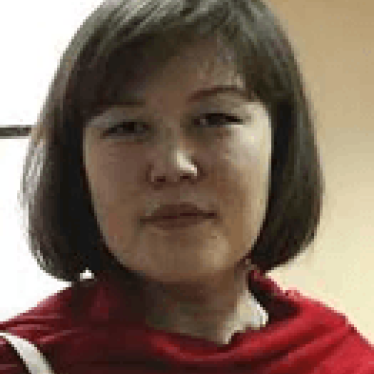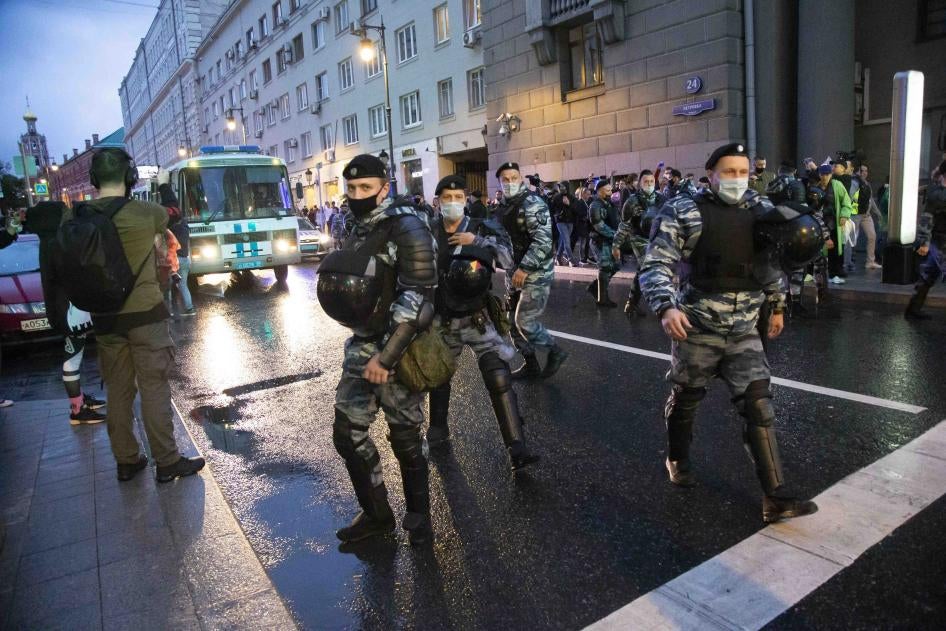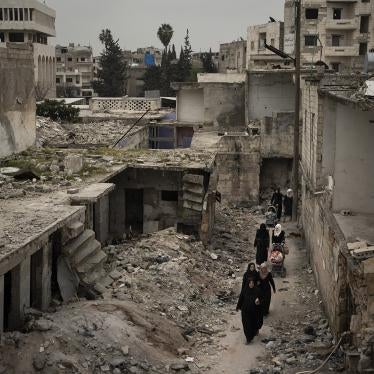A mother pleads with police, “Where are you taking him, he didn’t do anything!” and then addresses the crowd - “my son is a minor, he didn’t do anything!” Journalists run around, shouting “Let him go, he’s a journalist,” and then clapping when they managed to convince police to let go one of their own. Police in body armour are forming chains of three to five men. They run through the crowd, sometimes asking each other, “This one?” and appear to randomly grab people standing around peacefully, many of them recording the events on their smartphones.
These were some of the scenes and voices from mass detentions that happened on 15 July in central Moscow.
Just a few hours earlier, people gathered peacefully in Pushkin Square, also in central Moscow, calling for an annulment of the results of the recent constitutional amendment plebiscite. The opposition had denounced the vote as rigged. The response was mass detentions.
The “No!” campaign had applied to hold the protest but mayor’s office refused, citing the need to prevent the spread of the virus that causes Covid-19. So, the activists reformatted the event. They would instead collect signatures against the plebiscite’s results, at the same time and place as the proposed protest. They called on people to organise a line while they waited to sign a petition and observe social distancing.
On Wednesday evening, despite pouring rain, several hundred people showed up in Pushkin Square. In St Petersburg a line of people queuing to put their signature stretched about 600 metres.
Gradually the signature collection in Moscow transformed into more conventional protest, with people chanting slogans and some raising placards. Around 9pm a large group began a “stroll” along the streets of Moscow’s Boulevard Ring, chanting slogans. They were peaceful, although at some point they were effectively blocking traffic.
A large column of police, including riot police arrived, quickly pushing people to the sidewalks and detaining them, in some cases apparently at random.
In video footage I watched, I saw police attempting to detain journalists twice, and then release them. But several were detained, the Russian Union of Journalists said, calling for their release.
Police detained one of the signature organisers, municipal deputy Yuliya Galyamina, at Pushkin Square, accusing her of organising an unsanctioned public event, detaining her daughter too. They were one of several families detained that evening. There are reports that some of the children were separated from their parents when detained and processed separately too. According to Russia’s children’s ombudsperson 12 children were detained.
The city’s authorities had cited the “epidemiological situation” as grounds to deny permission for the protest, but the police evidently seemed less concerned about that. They put detainees in overcrowded, poorly ventilated buses that didn’t allowing for social distancing, potentially exposing the occupants to Covid-19. They kept people there sometimes for hours and prevented lawyers from having access to them or even entering the police station.
Among those detained was Marina Litvinovich, a member of Moscow’s Public Monitoring Commission (ONK), an independent expert body authorised to monitor detention sites. She wrote that police held her in a cramped police bus for nearly five hours, together with 22 other people, 11 of whom said they had been merely passing by or were exiting bars along the street. The police, she wrote, did not allow lawyers to access them, while telling detainees there were no lawyers.
Police reported that 132 people were detained, while local independent monitors’ headcount was 147 Media reports reiterate claims that some detained were merely passers-by snatched off the street by police.
Other due process violations, now routine in these kinds of situations, also occurred such as police officers not identifying themselves, in many cases with their badges covered, failing to explain the grounds for detention and in some cases using excessive force
Almost everyone was eventually released, many in the early hours of the following day, with administrative offence citations or a summons to report to police for processing. Some were charged with violating public assembly rules and face fines, while many could face detention for up to 30 days on charges of impeding traffic or repeated violation of public assemblies regulations. The first trials began the next day, with two protesters slapped with fines and another two sentenced to 10 days’ detention each.
Obviously, taking steps to slow the spread of Covid-19 is of paramount importance. But when Moscow authorities have decided to lift almost all restrictions – including re-opening of cinemas and increasing the stadium to half of their full capacity for sport events – it is hard to view a blanket ban on outdoor mass gatherings as anything but an opportunistic measure to clamp down on critics. Authorities made no effort or pretense to strike a balance between proportionate public health measures and the rights to freedom of assembly and expression when it came to a sensitive issue for the Kremlin. By contrast, the authorities have found way to organize events, like a book festival in early June or the Victory parade on 24 June in the very heart of Moscow.
Authorities could have instructed organisers to ensure that participants wear masks and diligently observe social distancing, or imposed a reasonable maximum number of people at a location at any given time, and held organisers responsible if conditions were not observed. But instead they chose to deploy police against peaceful protests in Moscow and carry out mass detentions. This can only leave one skeptical as to whether public health concerns were ever the primary consideration.









